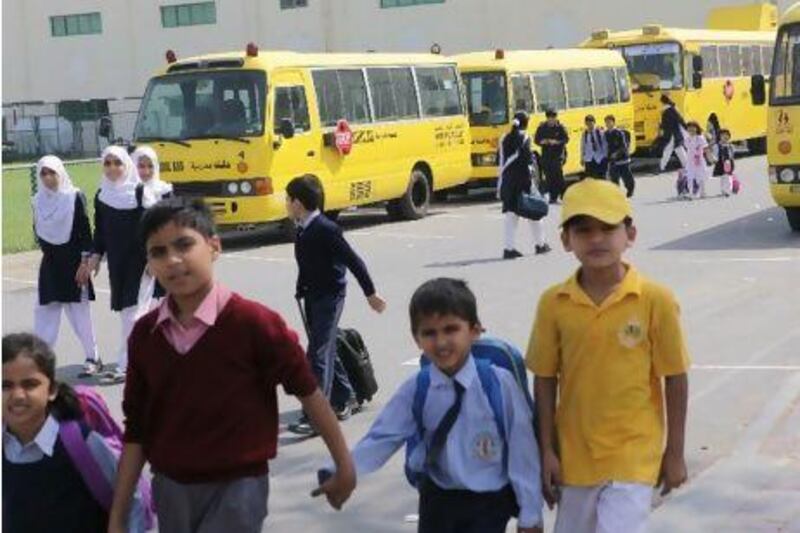DUBAI // Pakistani schools in the Emirates are grappling with poor head teachers who lack the motivation to improve standards, experts have warned.
The plunging quality of schools that follow the Pakistani Federal Board of Intermediate and Secondary Education curriculum has been repeatedly highlighted, most recently this month in a Dubai Schools Inspection Bureau (DSIB) report that rated most Pakistani schools as "unacceptable".
MORE UAE NEWS: Our pick of today's top local news stories
Amy Winehouse: a little girl lost in Dubai Within seconds of Amy Winehouse stepping on stage in Dubai last February, it was clear she was a wreck. Read article
Tent safety rules set out for Ramadan Safety regulations will be strictly enforced for Iftar tents with the aim of full compliance from residents, hotels and businesses. Read article
UAE's Pakistani schools receive poor report card Many head teachers lack the motivation - and the money - to improve standards. Read article
[ MORE UAE NEWS ]
The report said weak leadership and poor governance were holding back the schools, which between them educate more than 3,500 pupils.
Dr Faiz M Ishaq, the head of the Szabist university campus in Dubai, said the poor state of schooling was causing "long-lasting damage" to the Pakistani talent pool.
"The image of the Pakistani community and the education is quite low at the moment," he said. "When the schools have such low standards it reflects badly on us as well."
Dr Ishaq said Pakistani schools were in a state of stagnation at the moment.
"The schools are not motivated, the parents are not either and do not see the need for change," he said.
Pakistani schools cater to middle and low-income families, charging not more than Dh5,200 a year in tuition fees.
Some principals say the low fees prevent them from putting improvements in place.
Ghosia Iqbal, the principal of the Al Farooq Pakistani Islamic School in Dubai, described the school's revenue as meagre.
"All other schools have high fee structures and can bring those changes," she said.
"Here, parents will not be able to pay if we try to increase the fees."
Al Farooq was rated as unsatisfactory by DSIB for didactic teaching methods and a lack of professional development for teachers.
Heads of departments were not sufficiently aware of their roles, and parents were not involved in any of the school activities.
Jameela Al Muhairi, the chief of DSIB, blamed mismanagement, not a lack of funds.
"The problem in these schools is the leadership who have not been able to act upon our recommendations," she said. "They need external professional help to get them out of the situation."
The Pakistan Education Academy (PEA), a school in Oud Mehta, recently acted on the authority's recommendation and hired a consultant to assess its weaknesses.
Mohammed Rashid Ashraf, a board member at the not-for-profit school, admitted issues with individual board members and an internal power struggle had caused problems.
"For a while the original management who started the school was not in charge," he said. "Under a board which had a personal interest that did not match the education goals, the school lost its goodwill."
Now the initial founders of the school, set up in 1968, are trying to turn a new leaf by bringing more professionals on to the board and recruiting teachers who are more qualified. "One of our aims is to keep the fees as low as possible but at the same time provide the highest standards and facilities," he said.
A new principal will also take charge in September, tasked with improving teacher training and health and safety. The school also aims to develop its labs and sports facilities.
DSIB noted that teachers in Pakistani schools had little professional development and were unaware of modern teaching methods. Dr Ishaq said his university had offered schools free courses for their teachers to address that. "Unfortunately none of the schools showed any interest in the training and we have not received any feedback," he said.
Attendance has been dwindling at the Pakistani schools, with most children being absent for extended periods.
A solution to that would be developing better links with universities to encourage more pupils to continue education, Dr Ishaq said.
"We are looking to provide schemes for early school leavers, who will have the opportunity to take up vocational programmes at the university," he said.
"We will also work with the Pakistani community to come up with positions for them."
Liyaqat Ali, a father of two children at the PEA, said the school's academic results had always been good but he would like to see more qualified teachers and training.
"Some of the old teachers do not know how to use the computer and sometimes worksheets are handwritten," he said.
Parents were not looking for grand facilities, he said - just better teachers.
"I think they should invest more in their staff and try to raise their salaries," he said.
Mussarat Hussain, the academy's founding chairman, said it was planning to revisit teachers' salaries.
"The old managements did not take this into consideration," he said.
"The salaries are low and we are looking at revising them."






